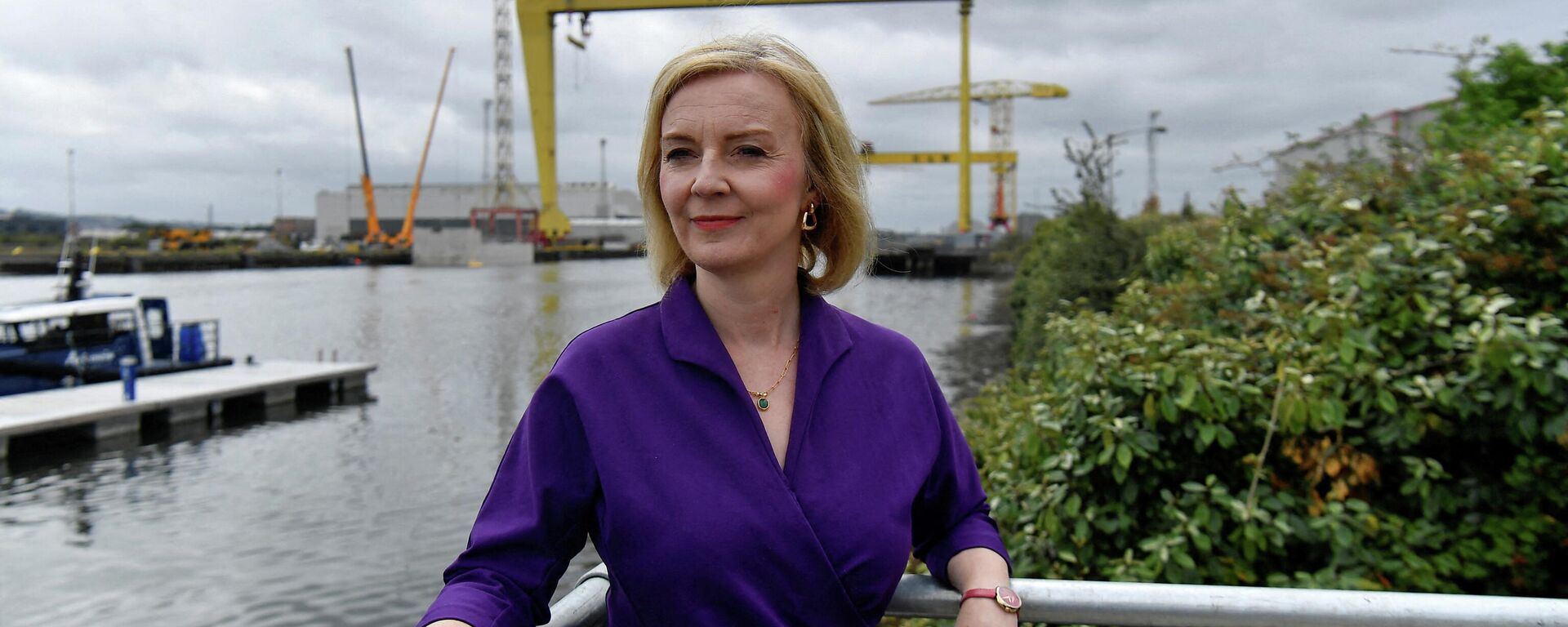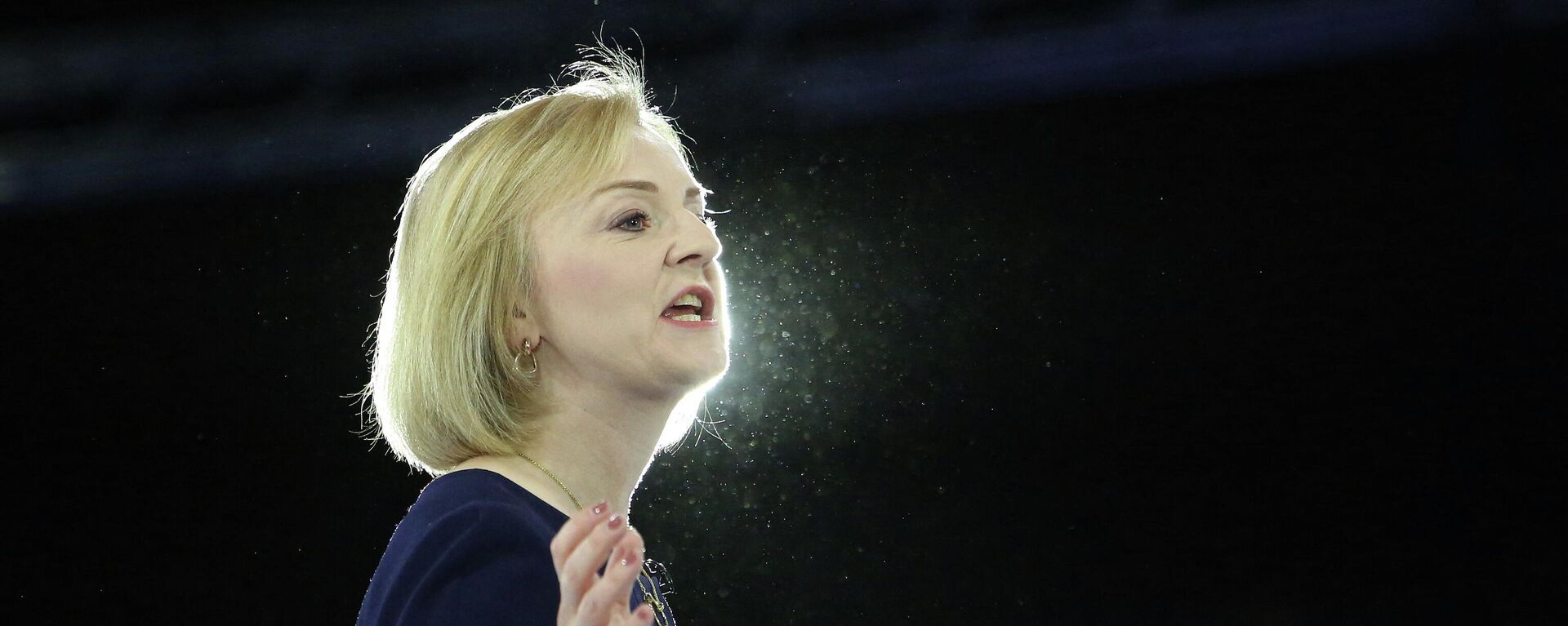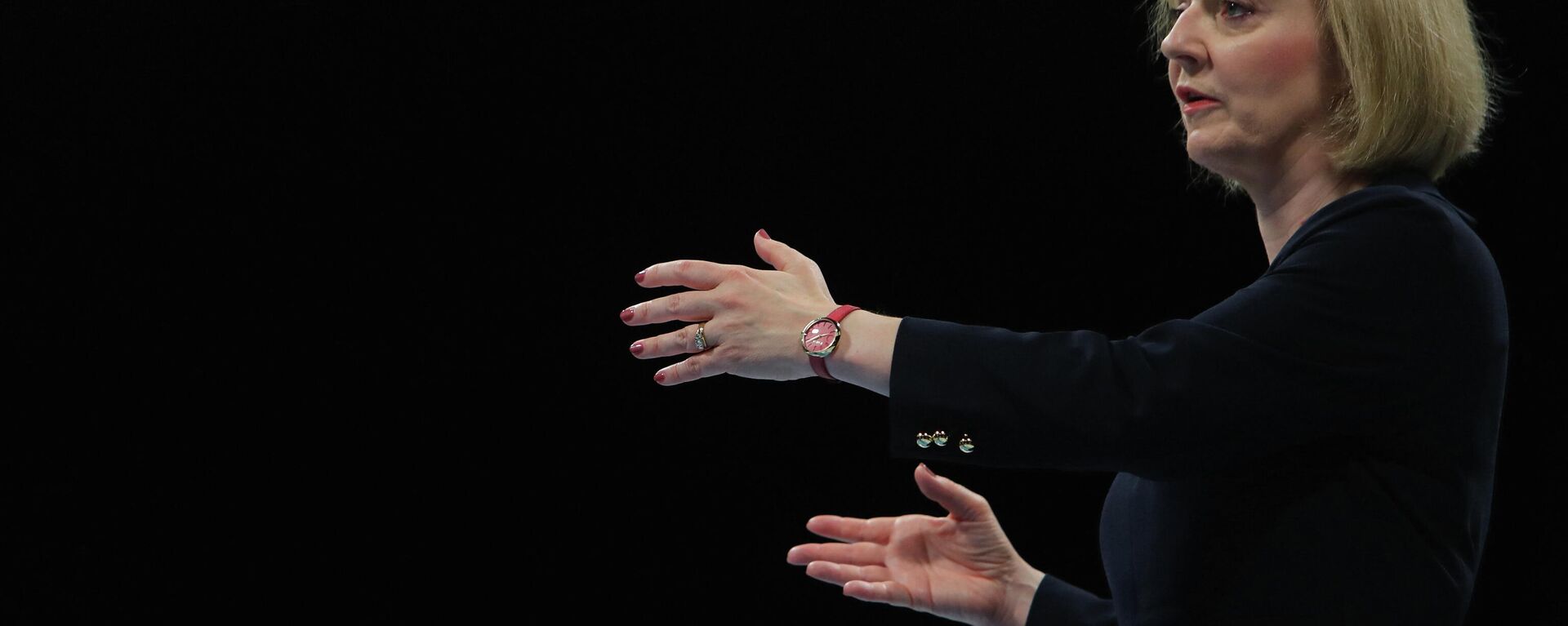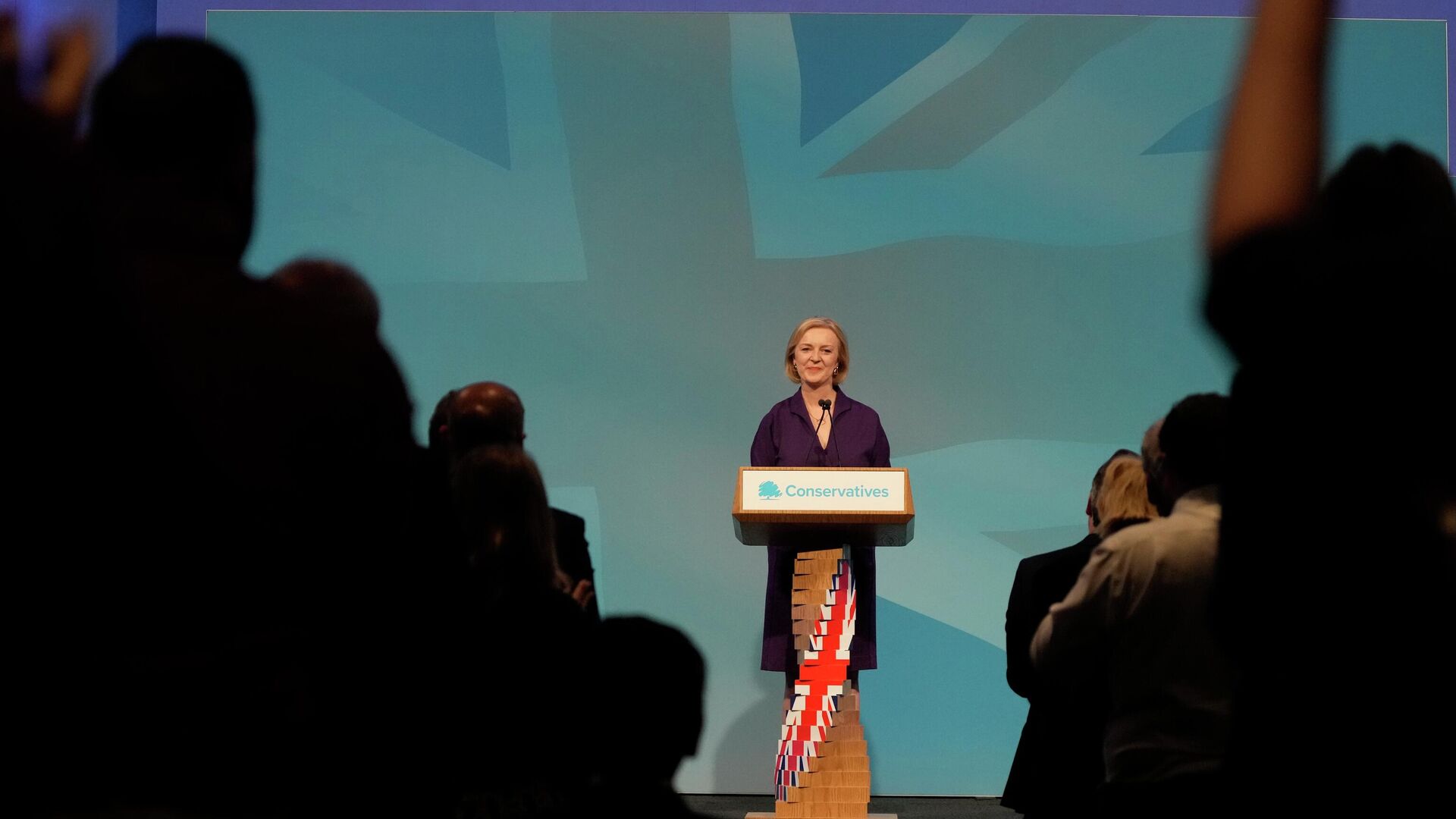https://sputnikglobe.com/20220908/how-truss-energy-bills-freeze--drilling-plans-may-amplify-uks-problems-1100554416.html
How Truss' Energy Bills Freeze & Drilling Plans May Amplify UK's Problems
How Truss' Energy Bills Freeze & Drilling Plans May Amplify UK's Problems
Sputnik International
UK Prime Minister Liz Truss has unveiled a set of measures in order to help households and businesses pay soaring energy bills, which will be capped at £2,500... 08.09.2022, Sputnik International
2022-09-08T17:59+0000
2022-09-08T17:59+0000
2023-05-28T15:21+0000
analysis
us
energy
liz truss
borrowing
energy crisis
europe
gas
oil
inflation
https://cdn1.img.sputnikglobe.com/img/07e6/09/05/1100394284_0:59:3072:1787_1920x0_80_0_0_3397d4f06524d44d62b6e85f50fa839a.jpg
UK Prime Minister Liz Truss announced on September 8 that she would cap gas and electricity prices at a maximum of £2,500 a year for two years to fight the energy crisis. Prior to Truss' move, energy bills were due to increase to £3,548 ($4,080) per year for dual fuel (electricity and gas) for an average household from October 1, 2022.The newly unveiled plan will save a typical household £1,000 a year, coming in addition to the £400 energy bills support scheme – a brainchild of the previous Boris Johnson government. Still, it's a little bit too early to pop the champagne, according to Marc Ostwald, chief economist at ADM Investor Services International.While lowering the energy price cap down to £2,500 "should help," the crux of the matter is that energy bills have been frozen at a level considerably exceeding the October 1, 2021 price cap of £1,277, according to the economist.Furthermore, the freezing of energy bills does not necessarily mean halting the consumer prices rally, he notes. Previously, Truss claimed that the energy bill cap will lower inflation by five percentage points from what it otherwise would have been if the full energy price increase had gone ahead. However, according to Ostwald, "it is nothing more than a guesstimate.""Yes, to a certain extent it is going to alleviate some of the consumer price pressures, but it's no guarantee that it will bring consumer prices rapidly down," Ostwald says. "And we're probably still going to see a peak in inflation in the UK around the 13 to 14 percent mark. A lot of businesses have been holding back on passing things through. Now with a little bit better visibility, they can probably start to pass a few more things on, but that's the second round effects which are very difficult to quantify."Truss' Scheme Will Eventually Fall on UK TaxpayersTo complicate matters further, the new Conservative government's energy scheme will be funded through more government borrowing and could cost the UK around £150 billion ($172.2 billion), according to some estimates.Last month, the Tories' major opponents, the Labour Party, proposed its own plan to freeze energy prices through an extended windfall tax on the profits of energy companies to save households £1,000 this winter. Earlier this year, a temporary £5 billion levy on energy giants was announced by then-Chancellor Rishi Sunak to soften the impact of the cost of living crisis.However, Truss on Wednesday ruled out a windfall tax on energy companies to pay for her plans to tackle UK energy prices as part of her bold bid to cut taxes.Following the announcement of the new scheme, Labour accused the prime minister of handing out a "blank cheque" to energy giants by ruling out a levy and leaving British taxpayers to "foot the bill."European economists share the Labour Party's concerns, suggesting that Truss' borrowing plan "could be felt for decades to come" in the UK: "[Truss] will have to follow only one path: opening up the door for a massive stimulus package and, once the crisis is settled, increasing taxation," Christopher Dembik, head of macro analysis at Saxo Bank, told CNBC News. "It’s great news for the short term, though the bill will eventually fall on taxpayers in the long run and could take generations to pay off."Offshore Drilling No Remedy to Current Energy CrisisThe newly-elected British prime minister also pledged to issue 100 oil and gas licenses in the North Sea to help boost domestic fuel supplies.Roughly £26 billion ($30 billion) in potential investments in the North Sea by the end of the decade "would enable the UK to meet about half its demand for oil and gas from domestic supplies," Bloomberg reports, citing Offshore Energies UK, a trade association for the United Kingdom offshore energies industry.At the same time, however, the industry group admitted that the new investment won’t provide an instant solution to the energy crisis. "New fields currently under development won’t start producing until late 2026 with peak production coming a year later," the media outlet emphasizes.Obstacles in Truss' PathAlthough Truss has been praised for taking swift action, the announcement is politically difficult for a number of reasons, according to Mark Garnett, a politics professor at Lancaster University and author of the book "The British Prime Minister in an Age of Upheaval" and "From Anger to Apathy: The British Experience.""First, Truss won support in the Conservative leadership election by promising cuts in taxation as an immediate priority," Garnett says. "In the current climate, any significant reductions in taxation will leave Truss vulnerable to charges of economic irresponsibility."Second, Truss has already been criticized because her tax-cutting approach seems to favor businesses and the rich: while No 10 will subsidize the rich, who can easily afford higher bills, it is still leaving the low-paid and pensioners having to choose between heating and eating, according to the academic."Third, the policy could be seen as a guarantee that energy producers will continue to enjoy massive profits for at least the next two years," he says. "By ruling out a 'windfall tax' which would pay for at least part of the policy, Truss stands accused of putting the bloated profits of the energy giants above the future living standards of ordinary Britons."Finally, Truss' commitment to oil and gas extraction in the North Sea, along with a more relaxed approach to the controversial process of gas extraction through onshore "fracking" clearly contradicts Europe's "green" agenda and does not solve the energy crisis in the near term, according to the professor. "[Truss'] pledge to make Britain a net exporter of energy by 2040 will have no effect on the current crisis," he argues.In addition to that, the Conservative Party remains "very, very divided," Ostwald warns.
https://sputnikglobe.com/20220906/why-liz-truss-risks-becoming-bojo-on-steroids-instead-of-new-maggie-thatcher-for-uk-1100458608.html
https://sputnikglobe.com/20220908/uk-pm-liz-truss-freezes-electricity-bills-for-two-years-1100537056.html
https://sputnikglobe.com/20220907/scholar-truss-appeasing-zelensky--biden-while-us-doesnt-even-treat-uk-as-equal-1100513746.html
united kingdom (uk)
Sputnik International
feedback@sputniknews.com
+74956456601
MIA „Rossiya Segodnya“
2022
News
en_EN
Sputnik International
feedback@sputniknews.com
+74956456601
MIA „Rossiya Segodnya“
Sputnik International
feedback@sputniknews.com
+74956456601
MIA „Rossiya Segodnya“
us, energy, liz truss, borrowing, energy crisis, europe, gas, oil, inflation, united kingdom (uk)
us, energy, liz truss, borrowing, energy crisis, europe, gas, oil, inflation, united kingdom (uk)
How Truss' Energy Bills Freeze & Drilling Plans May Amplify UK's Problems
17:59 GMT 08.09.2022 (Updated: 15:21 GMT 28.05.2023) UK Prime Minister Liz Truss has unveiled a set of measures in order to help households and businesses pay soaring energy bills, which will be capped at £2,500 per year from October 1. The British prime minister’s £150 billion ($172.2 billion) scheme will be funded through borrowing.
UK Prime Minister Liz Truss announced on September 8 that she would cap gas and electricity prices at a maximum of £2,500 a year for two years to fight the energy crisis. Prior to Truss' move, energy bills were due to increase to £3,548 ($4,080) per year for dual fuel (electricity and gas) for an average household from October 1, 2022.
The newly unveiled plan will save a typical household £1,000 a year, coming in addition to the £400 energy bills support scheme – a brainchild of the previous Boris Johnson government. Still, it's a little bit too early to pop the champagne, according to Marc Ostwald, chief economist at ADM Investor Services International.
"It really depends on what happens with gas and energy prices in general," Ostwald argues. "I have to stress that if gas prices remain high, then effectively what we're talking about here is an uncapped liability, because the measures have to stay in place, the plan is for two years, but who knows what happens with gas prices? We shall just have to see."
While lowering the energy price cap down to £2,500 "should help," the crux of the matter is that energy bills have been frozen at a level considerably exceeding the October 1, 2021 price cap of £1,277, according to the economist.
Furthermore, the freezing of energy bills does not necessarily mean halting the consumer prices rally, he notes. Previously, Truss claimed that the energy bill cap will lower inflation by five percentage points from what it otherwise would have been if the full energy price increase had gone ahead. However, according to Ostwald, "it is nothing more than a guesstimate."
"Yes, to a certain extent it is going to alleviate some of the consumer price pressures, but it's no guarantee that it will bring consumer prices rapidly down," Ostwald says. "And we're probably still going to see a peak in inflation in the UK around the 13 to 14 percent mark. A lot of businesses have been holding back on passing things through. Now with a little bit better visibility, they can probably start to pass a few more things on, but that's the second round effects which are very difficult to quantify."

6 September 2022, 18:31 GMT
Truss' Scheme Will Eventually Fall on UK Taxpayers
To complicate matters further, the new Conservative government's energy scheme will be funded through more government borrowing and could cost the UK around £150 billion ($172.2 billion), according to some estimates.
Last month, the Tories' major opponents, the Labour Party, proposed its own plan to freeze energy prices through an extended windfall tax on the profits of energy companies to save households £1,000 this winter. Earlier this year, a temporary £5 billion levy on energy giants was announced by then-Chancellor Rishi Sunak to soften the impact of the cost of living crisis.
However, Truss on Wednesday ruled out a windfall tax on energy companies to pay for her plans to tackle UK energy prices as part of her bold bid to cut taxes.
"I think really the more appropriate point is that a windfall tax could help to fund some of this," Ostwald says. "On the other hand, I would also say that it will probably deter a lot of energy sector companies from investing in the longer run… But even with the lack of a windfall tax, which, to be honest, seems to be coming from a corner which is about dogma, i.e. policy dogma – 'we can't do this, we can't do that because that's not the sort of thing that we do' - that could prove problematic."
Following the announcement of the new scheme, Labour accused the prime minister of handing out a "blank cheque" to energy giants by ruling out a levy and leaving British taxpayers to "foot the bill."
European economists share the Labour Party's concerns, suggesting that
Truss' borrowing plan "could be felt for decades to come" in the UK: "[Truss] will have to follow only one path: opening up the door for a massive stimulus package and, once the crisis is settled, increasing taxation," Christopher Dembik, head of macro analysis at Saxo Bank,
told CNBC News. "It’s great news for the short term, though the bill will eventually fall on taxpayers in the long run and could take generations to pay off."

8 September 2022, 10:46 GMT
Offshore Drilling No Remedy to Current Energy Crisis
The newly-elected British prime minister also pledged to issue 100 oil and gas licenses in the North Sea to help boost domestic fuel supplies.
Roughly £26 billion ($30 billion) in potential investments in the North Sea by the end of the decade "would enable the UK to meet about half its demand for oil and gas from domestic supplies," Bloomberg
reports, citing Offshore Energies UK, a trade association for the United Kingdom offshore energies industry.
At the same time, however, the industry group admitted that the new investment won’t provide an instant solution to the energy crisis. "New fields currently under development won’t start producing until late 2026 with peak production coming a year later," the media outlet emphasizes.
"In terms of the projects - they are another part of the costs in all of this, if the UK wants to speed up its nuclear power projects that will also require further taxpayer support," Ostwald says. "So, the big question here really is now ‘what is going to be announced when Kwasi Kwarteng has the emergency fiscal statement in a few weeks’ time?’ and then we'll have a better idea of how much this could cost."

7 September 2022, 18:45 GMT
Although Truss has been praised for taking swift action, the announcement is politically difficult for a number of reasons, according to Mark Garnett, a politics professor at Lancaster University and author of the book "The British Prime Minister in an Age of Upheaval" and "From Anger to Apathy: The British Experience."
"First, Truss won support in the Conservative leadership election by promising cuts in taxation as an immediate priority," Garnett says. "In the current climate, any significant reductions in taxation will leave Truss vulnerable to charges of economic irresponsibility."
Second, Truss has already been criticized because her tax-cutting approach seems to favor businesses and the rich: while No 10 will subsidize the rich, who can easily afford higher bills, it is still leaving the low-paid and pensioners having to choose between heating and eating, according to the academic.
"Third, the policy could be seen as a guarantee that energy producers will continue to enjoy massive profits for at least the next two years," he says. "By ruling out a 'windfall tax' which would pay for at least part of the policy, Truss stands accused of putting the bloated profits of the energy giants above the future living standards of ordinary Britons."
Finally, Truss' commitment to oil and gas extraction in the North Sea, along with a more relaxed approach to the controversial process of gas extraction through onshore "fracking" clearly contradicts Europe's "green" agenda and does not solve the energy crisis in the near term, according to the professor. "[Truss'] pledge to make Britain a net exporter of energy by 2040 will have no effect on the current crisis," he argues.
In addition to that, the Conservative Party remains "very, very divided," Ostwald warns.
"Truss has gone down a dangerous route by purging literally anyone who supported Rishi Sunak. The danger of a civil war breaking out again within the Conservative Party, particularly if some of these measures don't work, is actually quite large," the economist concludes.





